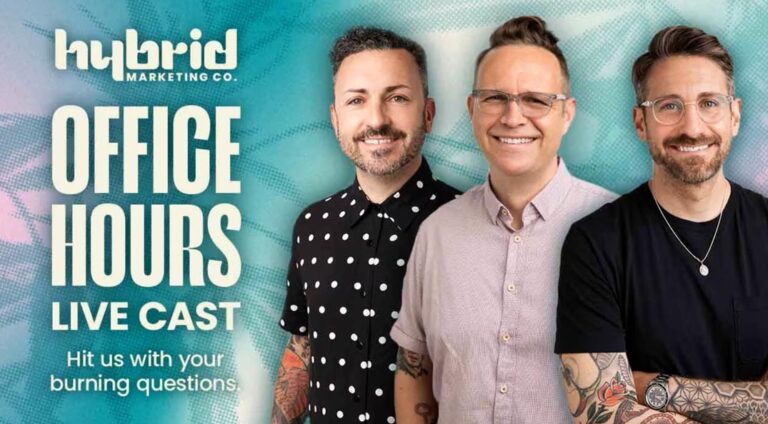Hybrid Marketing Co: Outcomes-Based Branding and Marketing for the Cannabis Industry
Office Hours
Why Cannabis Brands & Dispensaries Need to Become Love Brands
In this essential conversation for cannabis industry leaders, the team at Hybrid Marketing Co. explores what sets love brands apart from the rest—and why cultivating emotional loyalty is more than just a marketing strategy. It’s a business imperative.
What You’ll Learn:
- The true definition of a “love brand” and why it matters in cannabis
- Strategies to build deep, lasting customer connections
- Real-world lessons from Southwest Airlines, Bud Light, and Target
- The difference between love brands and lifestyle brands—and why it matters
- Steps your dispensary or cannabis brand can take today to grow loyalty and trust
Key Topics Covered:
- What makes customers fall in love with brands
- The psychology behind brand loyalty in cannabis
- Avoiding the missteps that erode trust
- Building authentic connections in a heavily regulated space
- How to implement a love brand strategy—no matter your budget
Transcript:
Featured Experts:
Matt Gillespie – VP of Creative, Hybrid Marketing Co.
Tyler Jacobson – Director of Marketing, Hybrid Marketing Co.
Aaron Rosenbluth – Director of Content, Hybrid Marketing Co.
Tyler Jacobson:
All right, thank you for joining us today. Welcome to Office Hours Live from Hybrid Marketing Co. I’m Tyler Jacobson, Director of Marketing here at Hybrid Marketing.
Matt Gillespie:
I’m Matt Gillespie, VP of Creative at Hybrid.
Aaron Rosenluth:
I’m Aaron Rosenluth, the Director of Content.
And this is Lefty, the Director of Things—the dogs, the Director of Snuggles.
Matt:
That’s right.
Tyler:
Today we’re going to be talking about love brands and how they relate to the cannabis industry. I can’t wait to talk about this. It’s something we’ve talked about a lot with clients over the years, and something we’ve talked about internally. Frankly, it’s not adopted enough.
Here’s the poison pill—if everybody adopts it, it’s just going to be a crowded marketplace, and then there is no love. You can’t love everybody all at once.
To start off: What is a love brand? Do you guys want to take a stab at your definition?
Aaron:
I’ll go. For me, a love brand is a company or a brand that I will support, shop at, and buy from no matter what. It’s about the experience I feel when I purchase a product or visit that establishment. I’ll choose it over a more cost-effective competitor. That’s what a love brand is to me.
Matt:
Yeah, it’s all of those things—and more. I think a love brand is a brand you connect with deeply, on an emotional level, almost without realizing it. It has all these intangible things embedded in its core. That can be intentional, but sometimes it happens organically—just by doing what they do with soul.
It connects so intensely that people will follow the brand to the ends of the earth—even if it means losing their home and all their money. It bypasses rational thought. You’ll go broke buying their stuff because the emotional connection is that strong.
Tyler:
You guys hit it on both the definition and emotional feel. It’s a brand with a deep emotional connection. The result? I’m going to look to them first when I have that categorical need. I’m not even going to notice competitors—and I don’t want to.
You don’t want to be in love with your spouse and then be looking for something better. No—you’re in love with your spouse. That’s where you go.
Because we’re talking about love, there’s a fine line between love and hate. So, let’s talk about brands that are politically “love brands” versus brands that aren’t. I’ll say it: Republicans are a love brand, and Democrats are not. And I say that as someone who isn’t a Republican.
What I mean is there’s a deep emotional connection. That’s what makes people go to that brand—despite any other party or ideas. Democrats? Not so much. Their base is often frustrated with them. You don’t feel the love back.
Matt:
There’s something super interesting in what you said. At first, I wasn’t sure about bringing politics into it, but it actually tracks. The love becomes so deep it hijacks rational thinking. That’s part of polarization. People defend love brands almost like family.
I think of sports teams—NFL teams are love brands. People will defend them fiercely. You even see violence at soccer matches because of that deep emotional connection. It overrides logic.
Aaron:
I had never thought of love brands in terms of politics, but it makes sense. I’ll add this: A love brand has to align with my personal core values. When I vote, I vote based on what aligns with me.
Tyler:
Yeah, and that gets us back to the textbook ingredients: authenticity, brand personality, shared values, stories, and personalized experiences. That’s what makes love brands unique.
But we’ve seen love brands lose their love. Let’s talk about Bud Light. Known for its patriotic, manly brand, it lost market share after pivoting to appeal to a new generation using a trans influencer. Their core audience saw it as a betrayal of the brand’s values.
Target is another example. People loved Target over Walmart because it stood for something—better design, fashion collabs, DEI values. But when they backed away from those, people felt betrayed. In my social circles, people said, “I’m never shopping there again.” Even if Target reinstates those initiatives, the trust is broken.
Matt:
Target did a great job for a long time. They managed to be for the masses and still feel like a love brand. They had big-name designer collaborations—Isaac Mizrahi, Michael Graves, Magnolia Home. You could get stylish, high-quality design at affordable prices. That felt like cultural celebration.
Aaron:
Southwest Airlines is my love brand. But even that is changing. What made them special? Two free bags, friendly service, humor, and being human. Now, as they cut back on those differentiators, that love erodes. And that helped me realize: a love brand pays attention to what its audience loves—and gives them more of that.
You can talk about authenticity and shared values all day, but if you’re not tuning in to what your audience loves and doing more of it, you’re not a love brand.
Matt:
When you stop being who your audience loves, you lose them. And in cannabis, this is especially relevant. We’ve heard, “Weed sells itself,” and that mindset leads people to think they don’t need a brand. That’s false—and disrespectful to the consumer.
Aaron:
Differentiation is huge in cannabis. And brand is one of the last places to do it well. Everyone claims “customer service” as their differentiator, but with budtenders cycling out every three months, how deep can customer service really be?
Tyler:
Right. The real differentiation comes when you understand your audience deeply and build an experience for them—so that even if the service isn’t perfect every time, the brand still resonates.
One reason cannabis brands aren’t love brands yet? Fear. If you try to be for everyone, you’re for no one. You have to pick who you’re for. I’ve heard it said, “If you’re for everyone, you’re for no one.” Love brands are about being for someone.
Aaron:
My favorite love brands aren’t trying to be for everyone. Like Rafa—the cycling brand. Super niche. They leaned into being pretentious, exclusive, and that built a passionate audience. They didn’t run from polarization—they embraced it.
Tyler:
Exactly. And Dangle Supply—that lifestyle pipe brand. Once you’re in, you’re in. You could buy pipes anywhere, but if you vibe with Dangle, you’ll buy from them every time.
Matt:
Can a brand be both a lifestyle brand and a love brand?
Tyler:
Yes. A lifestyle brand is aspirational. You adopt it to become something. A love brand is emotional—you’ve built a relationship over time. For me, Apple does both. They’ve thought through every moment of the user experience. I’ll never switch from Apple.
Aaron:
That’s a great example. There’s division between iPhone and Android users because Apple stands for something. It’s not just a product—it’s a belief system. It creates loyalty even when they make mistakes.
Tyler:
So how do cannabis brands become love brands? It starts with knowing your persona. Know who you want to attract. Build everything around them. Yes, it’s scary to feel like you’re excluding others—but focus brings clarity.
Matt:
I’d also say it starts with your values. Who are you, really? What’s your soul? That’s your compass. From there, your audience will find you—if you build the brand in an authentic way.
Tyler:
And if you’ve already launched? Survey your current audience. Find out what they love. Offer rewards or sweepstakes to get feedback. Go to your top-performing dispensaries and have conversations. What do they love? What don’t they love?
Aaron:
One of the best pieces of advice I ever got was: Look at your top 10 best customers and your worst 10. Study them. You’ll see patterns and insights that help refine your brand.
Tyler:
We had a question: What made me love Southwest over United?
Southwest went where I needed, at a fair price. Not dirt cheap, not overpriced. Their people were warm, funny. They gave me a drink coupon just for being nice. It felt like they cared. United? I’ve had them seat me away from my family. Missed flights even arriving early. It was a mess.
Aaron:
Southwest was consistent. They consistently gave you what you needed, which built trust and love. That’s a lesson: consistency matters in building emotional loyalty.
Matt:
Customer experience matters. Not just service. It’s about the design of the store, the scent, the music—how everything feels. Scent, in particular, is powerful for memory. If all your locations smell the same, that’s branding.
Tyler:
Exactly. And brands inside dispensaries? They’re not doing this yet. Think about Corona, Budweiser, Jack Daniels—they’re lifestyle brands. In cannabis, brands don’t often aim for that kind of cultural identity.
Aaron:
That’s a big missed opportunity. Most cannabis products aren’t that differentiated. If the tech, process, and form factor are mostly the same, your story has to be what sets you apart.
Tyler:
Too many brands think a logo is a brand. It’s not. A logo is a symbol. Your brand is your personality, tone of voice, values, and how people feel when they engage with you.
Matt:
And you can’t fake it. You can’t back into a story after the fact. You have to start with: Who are we? Who is this for? Then build from there.
Tyler:
Seth Godin said it best: “People like us do things like this.” That’s your brand. That’s how you find your tribe.
Aaron:
Gen Z is a great example. They’re willing to pay more for brands they love, even though they don’t have the same economic power older generations had. That means emotional connection really matters.
Matt:
Values matter—but you still need to test. A brand we worked with switched to sustainable packaging, and it backfired. Buds got crushed, and customers hated it. It’s a great example of trying to do the right thing—but the execution didn’t match the product needs.
Tyler:
Test before you commit. Even Nike tested the Colin Kaepernick campaign heavily before launch. It worked because they did the research. Not like the Solo Stove + Snoop Dogg flop.
Matt:
You can’t just throw a celebrity at something and call it a brand. You need depth, meaning, and alignment.
Tyler:
Even with a small budget, you can build a love brand. Do the work. Know your audience. Build experiences around them. If you do that, they won’t even think about the competition.









